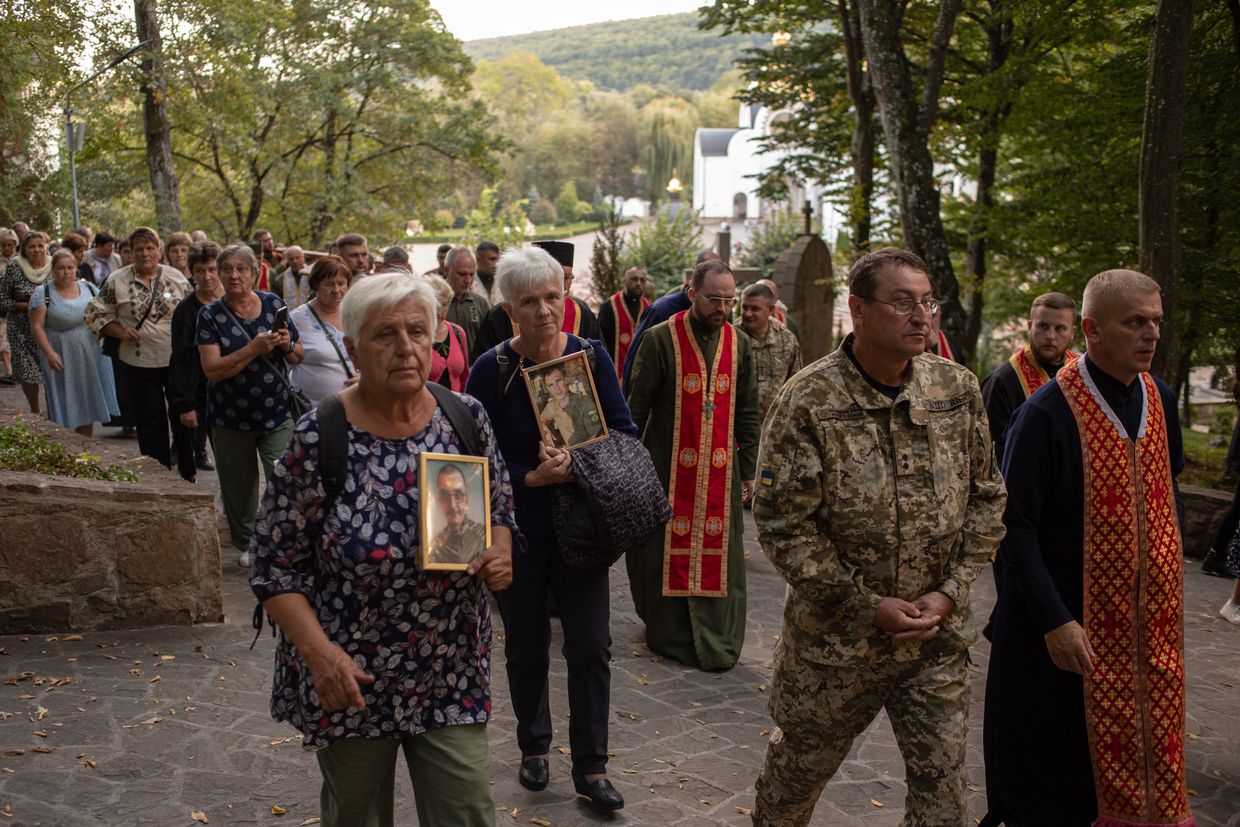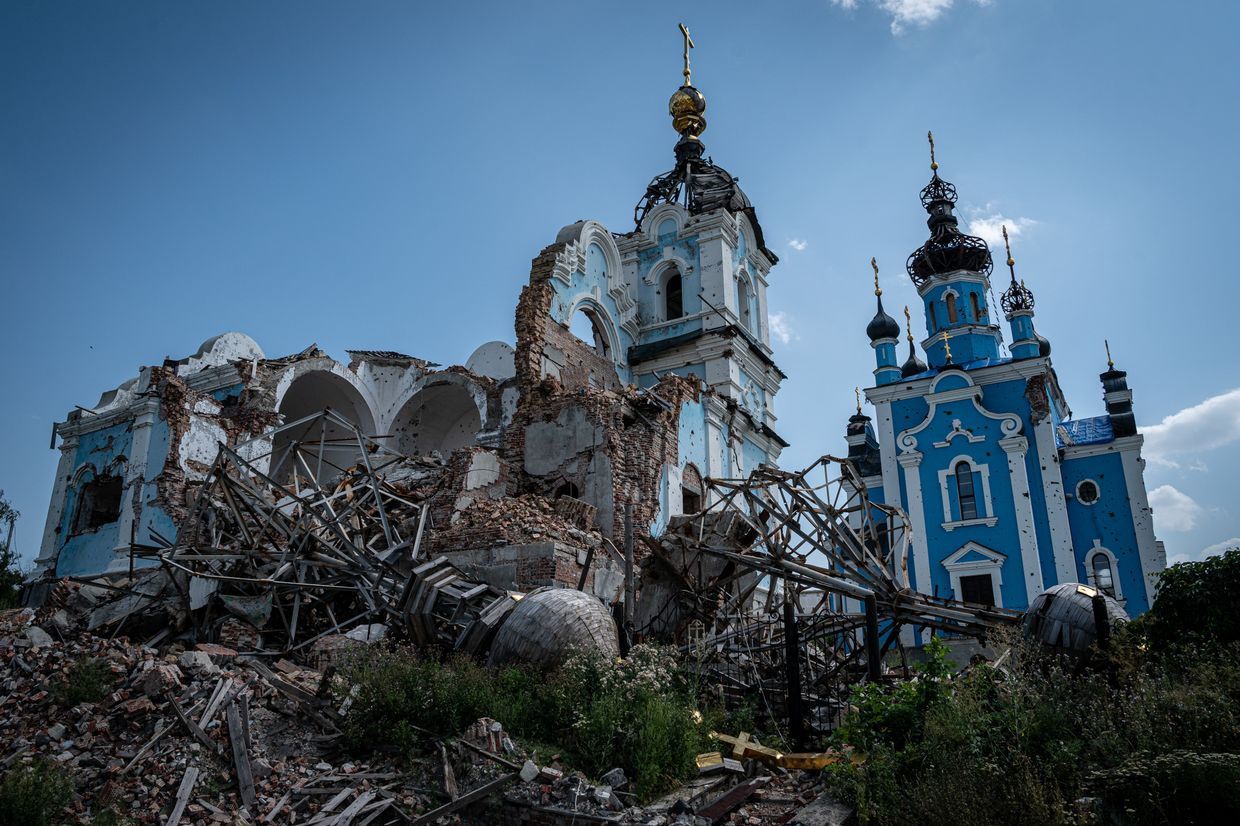Russia's persecution of Ukrainian clergy is part of an organized genocidal campaign

The interior of a church damaged by shelling is seen in Kostyantynivka, Donetsk Oblast, Ukraine, on April 18, 2025. (Roman Pilipey/AFP via Getty Images)

Danylo Mokryk
In 1953, Polish-American lawyer Raphael Lemkin, the man who coined the term "genocide," wrote a text titled Soviet Genocide in Ukraine. In it, Lemkin spoke not only about the Holodomor — the man-made famine organized in Ukraine by Stalin in 1932–1933 that claimed the lives of around 4 million people — but also about the Kremlin's broader genocidal practices against Ukrainians, which, he argued, had begun as early as the 1920s.
Lemkin wrote that Ukrainians were too numerous to be exterminated entirely in the way Adolf Hitler had attempted with Europe's Jewish population.
"Ukraine is highly susceptible to racial murder by select parts, and so the Communist tactics there have not followed the pattern taken by the German attacks against the Jews," the lawyer argued.

He went on to describe how this was carried out: "The first blow is aimed at the intelligentsia, the national brain, so as to paralyze the rest of the body.... Going along with this attack on the intelligentsia was an attack against the churches, priests and hierarchy, the 'soul' of Ukraine."
As an example of this attack against the "soul of the nation," Lemkin cited the liquidation of the Ukrainian Autocephalous Orthodox Church and the Ukrainian Catholic Church. "That Russification was clearly demonstrated by the fact that before its liquidation, the Church was offered the opportunity to join the Russian Patriarchate of Moscow, the Kremlin's political tool," he emphasized.
We are bringing back Lemkin's text again today, not for purely historical reasons. It helps explain what the Kremlin is currently doing in the territories of Ukraine it occupies.
We already referenced Soviet Genocide in Ukraine last year. In our investigative documentary Destroy in Whole or in Part, we argued that Russia's current genocidal practices in Ukraine broadly mirror what the Soviet regime has been doing a century back.
Our latest investigative documentary, No God but Theirs, which has just been released, compels us to revisit Lemkin's analysis once more.
This investigation examines the systematic persecution of Ukrainian Christians in Melitopol — a city in Ukraine's Zaporizhzhia Oblast, occupied by Russia since February 2022. It tells the story of churches (Protestant and Catholic alike) being banned, stripped of all property, and of priests and congregants being arrested, interrogated, and exiled.
While restrictions on religious freedoms are typical for Russia, the persecution in the occupied parts of Ukraine goes far beyond what occurs inside Russia itself.
And these persecutions indeed resemble an attack on the "soul of the nation" — precisely the kind Lemkin described.
It is an attack on Christians who, at the very outset of Russia's invasion, demonstrated a clear national identity. In response to the arrival of Russian troops and tanks in Melitopol, local believers began gathering daily on the city's central square. Protestants, Catholics, and Orthodox Christians together resisted the Russian occupation through joint prayer for Ukraine.
Moreover, in the chaos created by the Russian occupation, churches became islands of stability and order. Priests and pastors were seen more and more as moral authorities. For the Russians, therefore, to attack those churches in Melitopol meant also to strike against any alternative centers of power.
And the parallels with Lemkin's text do not end there.
Just as a hundred years back, as described by the author of the term "genocide," before simply banning the churches, the Russians attempted to absorb them first.

Pastor Mykhailo Brytsyn of the Grace Baptist Church recounts in our documentary how the Russian troops offered him a chance to publicly support the Russian authorities. Ukrainian Greek Catholic priest Oleksandr Bohomaz tells how agents of Russian security services tried to coerce him into revealing the secrets of his confessional. Pentecostal pastor Dmytro Bodyu describes how, during his imprisonment and interrogations, he was offered the chance to become a Russian informant.
Only after these efforts to convert Ukrainian clergymen in Melitopol into Russian assets had failed did Kremlin representatives decide to simply eliminate them — once again, fully following the model Lemkin described.
And there is another crucial point to highlight.
While restrictions on religious freedoms are typical for Russia, the persecution in the occupied parts of Ukraine goes far beyond what occurs inside Russia itself. This means that in places like occupied Melitopol, Russia is not merely replicating its usual policies — it is crafting a new, much harsher one specifically for Ukrainians.
Given all this, our new investigation of the persecution of Ukrainian Christian churches in Melitopol is a direct continuation of the previous documentary, which laid out the genocidal intent behind Russia's invasion of Ukraine.
Because, in line with Raphael Lemkin's deep and nuanced analysis, these persecutions amount to an attack on the Ukrainian nation as a group. An attempt to eradicate the soul of the Ukrainian nation — with the broader aim of destroying the nation in whole or in part.
Ultimately, the story of the persecution of Christians in Melitopol gives yet another reason to finally dare to use, in reference to Russia's actions in Ukraine, the very word that Lemkin coined — genocide.
Editor’s Note: The opinions expressed in the op-ed section are those of the authors and do not necessarily reflect the views of the Kyiv Independent.












